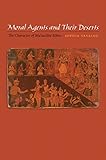Moral Agents and Their Deserts : The Character of Mu'tazilite Ethics / Sophia Vasalou.
Material type: TextPublisher: Princeton, NJ : Princeton University Press, [2008]Copyright date: ©2008Edition: Core TextbookDescription: 1 online resource (272 p.)Content type:
TextPublisher: Princeton, NJ : Princeton University Press, [2008]Copyright date: ©2008Edition: Core TextbookDescription: 1 online resource (272 p.)Content type: - 9780691131450
- 9781400824526
- Internet Access AEGMCT
- online - DeGruyter
- Issued also in print.
| Item type | Current library | Call number | URL | Status | Notes | Barcode | |
|---|---|---|---|---|---|---|---|
 eBook
eBook
|
Biblioteca "Angelicum" Pont. Univ. S.Tommaso d'Aquino Nuvola online | online - DeGruyter (Browse shelf(Opens below)) | Online access | Not for loan (Accesso limitato) | Accesso per gli utenti autorizzati / Access for authorized users | (dgr)9781400824526 |
Frontmatter -- Contents -- Preface -- Acknowledgments -- 1. The Framework: The Mu'tazilites -- 2. Reading Mu'tazilite Ethics -- 3. Theology as Law -- 4. The Baṣran Mu'tazilite Approach to Desert -- 5. Moral Continuity and the Justification of Punishment -- 6. The Identity of Beings in Baṣran Mu῾tazilite Eschatology -- Appendix. Translation From Mānkdīm Shāshdīw, "The Promise And The Threat," In Sharḥ Al-Uṣūlal-Khamsa -- Notes -- Bibliography -- Index
restricted access online access with authorization star
http://purl.org/coar/access_right/c_16ec
Must good deeds be rewarded and wrongdoers punished? Would God be unjust if He failed to punish and reward? And what is it about good or evil actions and moral identity that might generate such necessities? These were some of the vital religious and philosophical questions that eighth- and ninth-century Mu'tazilite theologians and their sophisticated successors attempted to answer, giving rise to a distinctive ethical position and one of the most prominent and controversial intellectual trends in medieval Islam. The Mu'tazilites developed a view of ethics whose distinguishing features were its austere moral objectivism and the crucial role it assigned to reason in the knowledge of moral truths. Central to this ethical vision was the notion of moral desert, and of the good and evil consequences--reward or punishment--deserved through a person's acts. Moral Agents and Their Deserts is the first book-length study of this central theme in Mu'tazilite ethics, and an attempt to grapple with the philosophical questions it raises. At the same time, it is a bid to question the ways in which modern readers, coming to medieval Islamic thought with a philosophical interest, seek to read and converse with Mu'tazilite theology. Moral Agents and Their Deserts tracks the challenges and rewards involved in the pursuit of the right conversation at the seams between modern and medieval concerns.
Issued also in print.
Mode of access: Internet via World Wide Web.
In English.
Description based on online resource; title from PDF title page (publisher's Web site, viewed 30. Aug 2021)


